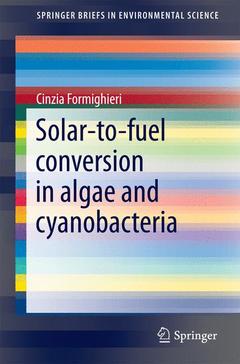Description
Solar-to-Fuel Conversion in Algae and Cyanobacteria, 2015
SpringerBriefs in Environmental Science Series
Author: Formighieri Cinzia
Language: English
Subject for Solar-to-Fuel Conversion in Algae and Cyanobacteria:
105 p. · 15.5x23.5 cm · Paperback
Description
/li>Contents
/li>Biography
/li>Comment
/li>
?This volume is focused on solar-to-fuel conversion using algae and cyanobacteria for advanced generation biofuels. Production of biofuels needs to rely on cheap and renewable resources, in order to be economically viable and environmentally sustainable in the long term. Solar energy is an abundant and renewable resource, and strategies for solar-to-fuel conversion have the potential to sustain our energy demands in the long term and to be carbon-dioxide neutral. First generation biofuels are those already on the market, such as bio-ethanol from sugarcane and corn starch, biodiesel from oil seed crops. However, development of a single biofuel, as efficient as it may be, would be insufficient and could not sustain the global demand for energy.
The next generation of advanced biofuels explores alternative feedstocks and technologies, finding novel solar-to-fuel solutions. Algae and cyanobacteria can convert sunlight into chemical energy through the process of photosynthesis. They represent an alternative with respect to crops for solar-to-fuel conversion that does not compete with food for arable land. This SpringerBrief focuses only on solar-to-fuel conversion for production of advanced biofuels, pointing to the importance of relying on the sun for our sustainability in the long term. It is the only current publication to discuss the problem of light-utilization inefficiency during mass cultivation of micro-algae. This review also addresses the potential of cyanobacteria for the generation of direct photosynthesis-to-fuel platforms and discusses both possibilities and constraints for future developments.

